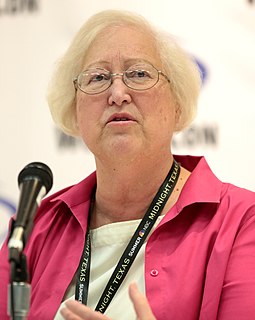A Quote by Connie Willis
I have great faith in the future of books - no matter what form they may take - and of science fiction.
Quote Topics
Related Quotes
I often use detective elements in my books. I love detective novels. But I also think science fiction and detective stories are very close and friendly genres, which shows in the books by Isaac Asimov, John Brunner, and Glen Cook. However, whilst even a tiny drop of science fiction may harm a detective story, a little detective element benefits science fiction. Such a strange puzzle.
I find it interesting that authors of fantasy and science fiction novels are rarely asked if their books are based on their personal experiences, because all writing is based on personal experience. I may not have gone on an epic quest through a haunted forest, but the feelings in my books are often based on feelings I've had. Real-life events, in fantasy and science fiction, can take on metaphorical significance that they can't in a so-called realistic novel.
I would say that most of my books are contemporary realistic fiction... a couple, maybe three, fall into the 'historic fiction' category. Science fiction is not a favorite genre of mine, though I have greatly enjoyed some of the work of Ursula LeGuin. I haven't read much science fiction so I don't know other sci-fi authors.
To be a science fiction writer you must be interested in the future and you must feel that the future will be different and hopefully better than the present. Although I know that most - that many science fiction writings have been anti-utopias. And the reason for that is that it's much easier and more exciting to write about a really nasty future than a - placid, peaceful one.
There's no real objection to escapism, in the right places... We all want to escape occasionally. But science fiction is often very far from escapism, in fact you might say that science fiction is escape into reality... It's a fiction which does concern itself with real issues: the origin of man; our future. In fact I can't think of any form of literature which is more concerned with real issues, reality.
The truth is that Trout, like Vonnegut and Ray Bradbury and many others, writes parables. These are set in frames which have become called, for no good reason, science fiction. A better generic term would be 'future fairy tales'. And even this is objectionable, since many science fiction stories take place in the present or the past, far and near.
The main difficulty is finding an idea that really excites me. We live in an age when miracles are no longer miracles, and science and the future are losing their sense of mystery. For science fiction, or at least the type of science fiction I write, this development is almost fatal, but I'm still giving it all I've got.




































